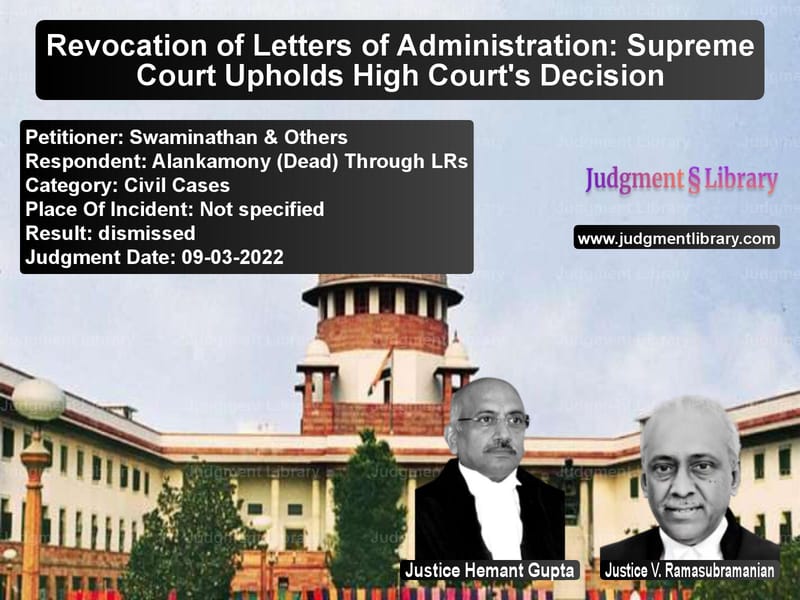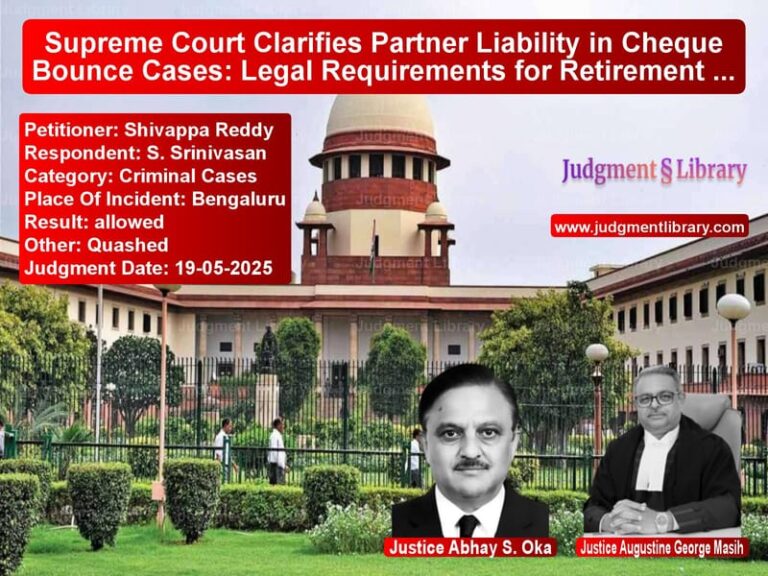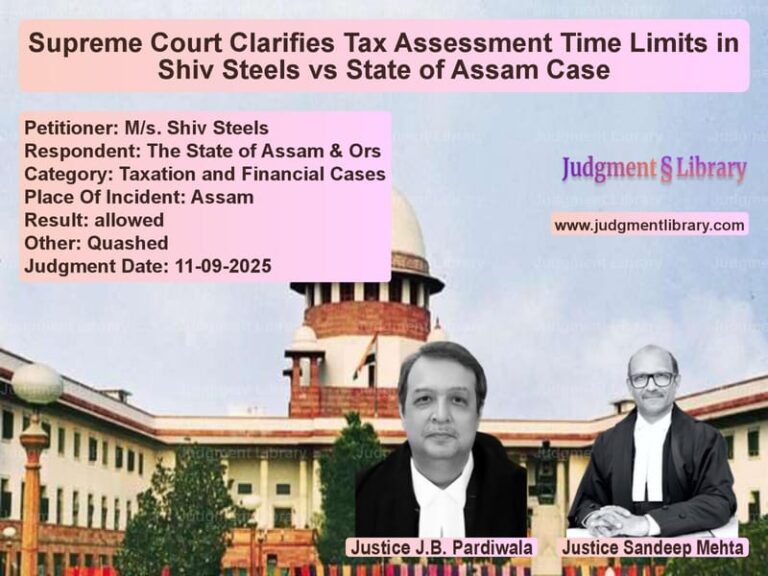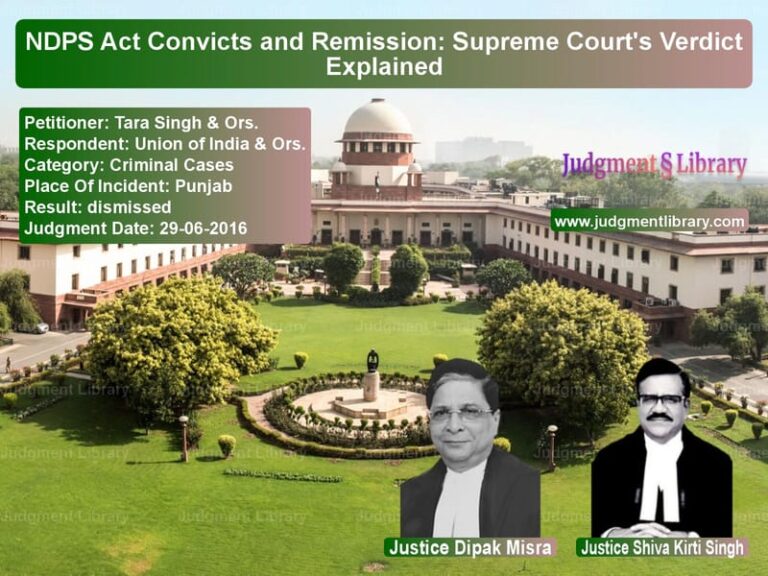Revocation of Letters of Administration: Supreme Court Upholds High Court’s Decision
The case of Swaminathan & Others vs. Alankamony (Dead) Through LRs revolves around the revocation of Letters of Administration granted under the Indian Succession Act, 1925. The Supreme Court upheld the High Court’s decision to revoke the Letters of Administration, reinforcing the importance of due process in succession matters.
This ruling provides clarity on the requirements for obtaining Letters of Administration and highlights the legal provisions under which such grants can be revoked if they were obtained without proper disclosure or by excluding interested parties.
Background of the Case
The appellants, Swaminathan and Others, had sought Letters of Administration for a registered Will executed by Thankappan Nadar in their favor. The Letters of Administration were granted on March 9, 2002. However, another brother of the deceased later challenged this grant, claiming that all legal heirs had not been impleaded in the proceedings.
The Civil Court initially dismissed the revocation application. However, the High Court overturned this decision and revoked the Letters of Administration, leading the appellants to approach the Supreme Court.
Legal Issues Considered
- Whether the appellants’ petition under Section 276 of the Indian Succession Act was valid without including all legal heirs.
- The distinction between applications under Section 276 (Petition for Probate) and Section 278 (Petition for Letters of Administration).
- Whether the High Court was justified in revoking the Letters of Administration under Section 263 of the Act.
Petitioner’s Arguments (Swaminathan & Others)
- The appellants argued that their petition was filed under Section 276 for probate, and therefore, the requirement to mention all family members, as stipulated under Section 278, did not apply.
- They contended that the High Court erred in setting aside the Letters of Administration when the initial proceedings were in compliance with Section 276.
- They claimed that the revocation of the Letters of Administration was unjustified and without sufficient legal basis.
Respondent’s Arguments (Alankamony’s Legal Representatives)
- The respondents argued that the Letters of Administration were obtained without citing all legal heirs, making the proceedings defective in substance.
- They relied on Section 263 of the Indian Succession Act, which allows for the revocation of grants when material facts have been concealed.
- They maintained that the appellants deliberately failed to disclose the existence of other heirs, which constituted just cause for revocation.
Supreme Court’s Judgment
The Supreme Court bench, comprising Justices Hemant Gupta and V. Ramasubramanian, upheld the High Court’s decision to revoke the Letters of Administration. The Court noted:
“As per Section 263, the grant of Letters of Administration may be revoked for ‘just cause.’ Explanation (a) under Section 263 states that just cause shall be deemed to exist where the proceedings were defective in substance.”
The Court highlighted that the appellants had not cited all legal heirs, which rendered the original grant defective. The Court further observed:
“The High Court was right in holding that a just cause existed for revoking the grant. Hence, we do not find any error in the order of the High Court warranting our interference.”
Key Takeaways from the Judgment
- The Supreme Court reaffirmed that failure to cite all legal heirs is a valid ground for revoking Letters of Administration.
- The judgment clarifies the distinction between applications under Sections 276 and 278 of the Indian Succession Act.
- The ruling emphasizes the importance of full disclosure in probate and succession matters.
- The High Court’s interpretation of “just cause” under Section 263 was upheld, reinforcing the principle that legal heirs must be properly cited in succession proceedings.
Implications of the Verdict
This ruling is a landmark decision in succession law, ensuring that legal heirs cannot be excluded from inheritance proceedings. The judgment serves as a cautionary precedent for individuals seeking probate or Letters of Administration without proper disclosure.
Read also: https://judgmentlibrary.com/supreme-court-restores-injunction-in-sholay-movie-rights-dispute/
For individuals involved in inheritance disputes, this ruling underscores the necessity of ensuring that all relevant parties are included in probate applications. It also highlights the Court’s commitment to preventing fraudulent or incomplete succession proceedings.
Ultimately, the Supreme Court’s verdict strengthens procedural integrity in inheritance law, ensuring that rightful heirs are not denied their legal entitlements due to omissions or misrepresentations in probate applications.
Petitioner Name: Swaminathan & Others.Respondent Name: Alankamony (Dead) Through LRs.Judgment By: Justice Hemant Gupta, Justice V. Ramasubramanian.Place Of Incident: Not specified.Judgment Date: 09-03-2022.
Don’t miss out on the full details! Download the complete judgment in PDF format below and gain valuable insights instantly!
Download Judgment: swaminathan-&-others-vs-alankamony-(dead)-th-supreme-court-of-india-judgment-dated-09-03-2022.pdf
Directly Download Judgment: Directly download this Judgment
See all petitions in Succession and Wills
See all petitions in Property Disputes
See all petitions in Judgment by Hemant Gupta
See all petitions in Judgment by V. Ramasubramanian
See all petitions in dismissed
See all petitions in supreme court of India judgments March 2022
See all petitions in 2022 judgments
See all posts in Civil Cases Category
See all allowed petitions in Civil Cases Category
See all Dismissed petitions in Civil Cases Category
See all partially allowed petitions in Civil Cases Category







